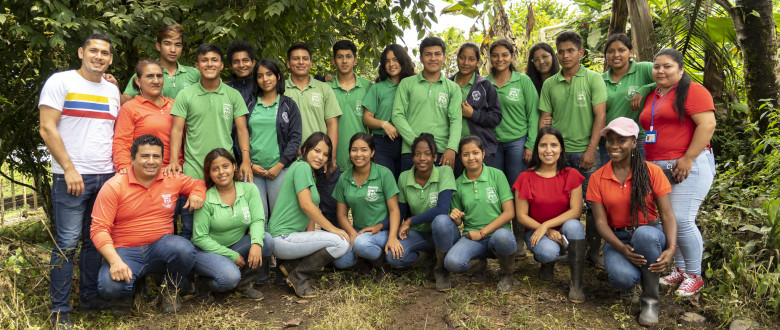
This year, the Working Group on Career Guidance of the Inter-Agency Group on Technical and Vocational Education and Training launched the first-ever Global Careers Month. Over the past month, a series of global and regional events put the spotlight on study and career guidance as a crucial effort to improve young people's employability and access to decent work.
In Ecuador, VVOB works in close partnership with the Ministry of Education to strengthen the quality of the study and career guidance system which plays an increasingly and important role in ensuring young people are able to navigate the world of work and reach their full potential.
Facing turbulent transitions
Even before Covid-19, young people in Ecuador were struggling to transition from school to work. The youth unemployment rate was more than double the national rate and it was particularly high for young women. Youth were also more likely to work in informal jobs than adults and usually in low-skilled jobs. They had lower earnings and there was a persistent gender gap. The pandemic, unfortunately, has aggravated this situation.
As Global Careers Month highlighted, in these turbulent times effective study and career guidance is particularly important to help young people make educational, training, and occupational choices that are both meaningful for them as well as informed by the realities of the world of work.
A regular part of education and training
Since 2015, the Ministry of Education and VVOB in Ecuador have been working hand in hand to make study and career guidance or orientación vocacional y professional (OVP) a regular part of education and training. A cadre of student counselors was established to enable learners to get to know their own talents, interests, and potential, discover in-demand fields of study and gain a better understanding of the world of work.
Staff members of the Departamentos de Consejería Estudiantil (DECE) were trained and a toolkit for study and career guidance was distributed nationwide. To continue to bring DECE on board, VVOB also developed a 40h course on study and career guidance and shaping learners’ life projects for the Ministry’s online professional development platform, Mecapacito.
Engaging employers and entrepreneurs
To further enhance the relevance for learners, VVOB is now collaborating with the Ministry in prototyping, piloting, and scaling modalities for engaging employers and entrepreneurs in the OVP system. Our initial focus will be on introducing career talks in secondary technical education, as the Bachillerato Técnico is an important springboard to the productive sector. Authentic, first-hand encounters with volunteers from the world of work are particularly powerful for shaping young people’s career aspirations. Acting as role models, these volunteers can dispel the gender stereotypes that still surround certain technical careers as well as unlock information and networks that ease the transition from school to work.
Through this work which falls under the ¡VAMOS! project, a five-year project, 156 educational authorities and 598 teachers from Esmeraldas, Manabí, Los Rios, Bolivar and Pastaza will be trained and supported to organise career talks with employers and entrepreneurs from the agri-food sector – a key, but underappreciated employment destination for youth in these provinces. By highlighting opportunities in agriculture that are knowledge-intensive, environmentally friendly and resistant to climate change, career talks can help guide youth towards sustainable futures.
While the country’s agri-food sector is a fundamental pillar of the Ecuadorian economy, many youth associate it with subsistence farming and are not aware of the entrepreneurial and advantageous opportunities the sector offers. Currently, there are more jobs available in the sector for students who graduate with a certificate in Agricultural Studies than there are skilled and qualified students. Quality, gender-responsive agricultural education and training play an important enabling role in motivating and skilling youth to pursue work in the agri-food sector. To date, however, the emphasis has been placed on academic knowledge and teacher-centric teaching practices which fail to motivate, skill and prepare youth for the changing demands in their economy.
Skilling for a sustainable future
As highlighted during Global Careers Month, providing targeted, relevant career guidance that matches a young person's interests and skills with the requirements of their local labour market is a constant challenge because it’s constantly in flux. Transferable and entrepreneurial skills have never been so important as not only do they provide a framework for successful learning in the classroom, but they equip learners with the skills and self-knowledge to thrive in a society where change is constant.




